What's New
Displaying results 231 - 240 of 4052
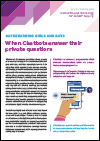
Resource | Publications,
The internet has become one of the primary sources of community and support for children and adolescent girls and boys, and they increasingly turn to it for information about sensitive issues such as sexuality, relationships, or health. Mobile phones and other digital devices allow them to find answers to their questions in relative privacy, anytime and anywhere. Chatbots are among the latest digital products being developed by those seeking to serve children and adolescents when it comes to digital sexuality education.
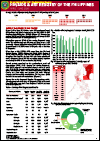
Resource | Fact Sheets,
From April to June 2020, there were 934 newly confirmed HIV-positive individuals reported to the HIV/AIDS & ART Registry of the Philippines (HARP) [Figure 1]. Twenty-nine percent (268) had clinical manifestations of advanced HIV infectiona at the time of testing.
Ninety-four percent (874) of the newly diagnosed were male. The median age was 28 years old (age range: 1-67 years old). Almost half of the cases (48%, 446) were 25-34 years old and 28% (259) were 15-24 years old at the time of diagnosis.
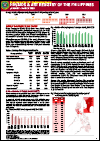
Resource | Fact Sheets,
From January to March 2020, there were 2,818 newly confirmed HIV-positive individuals reported to the HIV/ AIDS & ART Registry of the Philippines (HARP) [Figure 1]. Seventeen percent (473) had clinical manifestations of advanced HIV infectiona at the time of testing.
Ninety-four percent (2,658) of the newly diagnosed were male. The median age was 28 years old (age range: 1-78 years old). Almost half of the cases (48%, 1,359) were 25-34 years old and 30% (834) were 15-24 years old at the time of diagnosis.

Resource | Publications,
This report highlights the resource gaps in HIV programming for these communities and compares this to funding for the overall HIV response. The analysis is informed by documented spending on HIV programming for key populations in low and middle-income countries (LMICs) between 2016 and 2018.
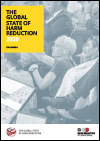
Resource | Publications,
This is the seventh edition of the Global State of Harm Reduction, compiled in a year when public health was leading the news agenda around the world. COVID-19 and the related measures introduced worldwide continue to disrupt life as we know it. This year the report added a new chapter dedicated to the impact of COVID-19 on harm reduction service delivery and people who use drugs. Also provided dedicated chapters on hepatitis C and tuberculosis (TB) to broaden the focus, in pursuit of a global health perspective.

Resource | Publications,
For the last eight years, efforts by Support. Don’t Punish campaigners have materialised with great dedication around a Global Day of Action, observed annually on 26 June. This day is also the the United Nations’ International Day Against Drug Abuse and Illicit Trafficking. Historically, this date has been used by governments to showcase drug control “achievements” in coercive terms that have no positive impact on communities’ well-being.
From grandstanding declarations of war, to burning displays of seized drugs, and even public trials where people criminalised for drug offences are sent off for execution, the gruesome theatrics of the “war on drugs” glorify violence and punishment over human dignity and rights.
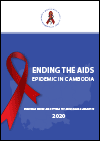
Resource | Publications,
The purpose of this study is to provide technical assistance for the development of investment scenario analysis that is tailored to the Cambodia AIDS response. Specifically, this investment scenario analysis was used as an integral component to support Cambodia in the preparation of funding application to the Global Fund for the implementation period from 2021 to 2023.

Resource | Publications,
A new UNICEF publication, Research on Violence against Children during the COVID-19 Pandemic: Guidance to inform ethical data collection and evidence generation, addresses key questions on generating VAC evidence that may arise during the pandemic to guide those considering conducting research and data collection on VAC during COVID-19.
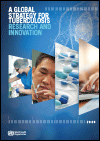
Resource | Publications,
The Global Strategy for Tuberculosis Research and Innovation will support the efforts of governments and other stakeholders to accelerate TB research and innovation, and improve equitable access to the benefits of research.
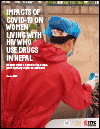
Resource | Publications,
A participatory research tool was developed collaboratively by Dristi Nepal (hereafter ‘Dristi’), and ITPC to capture and assess the impact of Covid-19. The qualitative survey tool used images and emoticons to encourage participants, regardless of literacy, to relate their experiences of healthcare services as people living with HIV, and to rank their government’s actions on health provisions and human rights both prior to and during the Covid-19 pandemic. Every component of the tool’s development and implementation was collaborative, from the formulation of indicators, to its inclusive design and analysis of findings.





